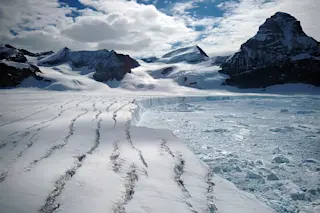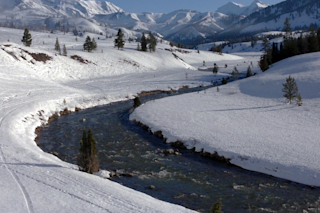In early 2002, the Larsen B Ice Shelf, a floating ice mass larger than the state of Rhode Island, fractured and collapsed into the ocean off the coast of Antarctica. The shelf remained stable for more than 10,000 years, yet its disintegration took just over a month.
While the event was monumental, it is not likely to be the last. As the climate warms the air and oceans, the fragility of venerable ice shelves around the world will be tested.
Researchers originally thought meltwater rivers protected the ice from collapse, but a recent observation cast doubt on their potential benefits. While rivers might prevent collapse for a while, what would happen when the channel is cut deeper?
"If you somehow cut the ice down to sea level, then maybe the river exits this protective regime and starts to promote fracturing," says Alexandra Boghosian, a postdoctoral research scientist at Lamont-Doherty Earth ...















